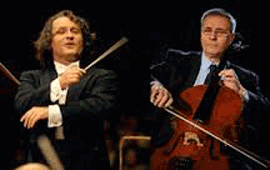> [Archived] Chronicles

Good Music and its Maestros at the Athenaeum
Changing 'the register', after the intermission, Horia Andreescu conducted works by composer Richard Strauss whose 150th anniversary is celebreated this year. He deliberately chose rich coloured scores, letting him create diverse plans, sometimes contrasting either in the programmatic poem Till Eulenspiegel (with its games full of verve and humour, in lyric or dramatic sequences, to finally resume, as a last breath, 'the flights' that define the evoked brilliant hero) or in Salomé – Dance of the Seven Veils, inspired also by a legendary character. The sentimental and vague sounds accumulated afterwards in a crescendo with almost terrifying outbursts. Both works were accomplished by the orchestra with a remarkable plasticity, the violin solos (Mioara Moroianu, concert master that evening) or those of the winds, as well as the percussions and the strings achieving moments of a transparency or, on the contrary, of a density utterly special, well balanced, in a unitary construction, without excesses, but with an effect that generated kaleidoscopic feelings and images, in an atmosphere that captured the entire audience. The enthusiastic applause rewarded both the quality of the programme and (most of all) the level of interpretation of an ensemble that outran itself, conducted by a maestro who knows how 'to take' the orchestra on the coordinates of his artistic creation. Surely an encore would have been wanted...
Translated by Ioana-Alexandra Dumitrescu and Elena Daniela Radu
MTTLC, The University of Bucharest














